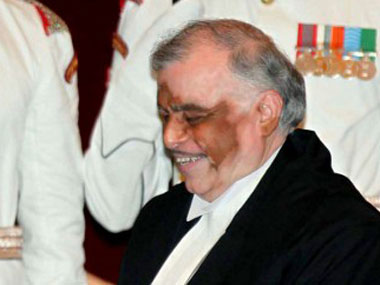The controversy over the reported appointment of former Chief Justice of India P Sathasivam continues to brew in Kerala with political leaders from the Congress and the CPM as well as constitutional experts expressing serious reservations. [caption id=“attachment_1692783” align=“alignleft” width=“380”]  Former CJI P Sathasivam. AFP[/caption] Seemingly, the most peeved over the decision of the Modi government are the Congress leaders. While chief minister Oomen Chandy maintained that he has not been consulted, the president of the Kerala Pradesh Congress Committee, VM Sudheeran said constitutional experts should examine the issue of a former Supreme Court Chief Justice (CJI) becoming a state governor. This move has been unprecedented in independent India. Sudheeran hinted at the appointment reducing the stature of the Chief Justice. The CJI administers oath of office to the President, how can such a person of high office be appointed the governor, he asked. In fact, he fired the first salvo on the issue. Chandy reportedly said that during his tenure as a chief minister, whenever a new governor was appointed, he was consulted, but not this time. Opposition to Sathasivam’s appointment also came from his own fraternity and the Bar associations. Former CJIs such as Justice Ahmadi and Justice GB Patnaik expressed reservations over his nomination. “He has to maintain the dignity of his position. It will lower the dignity of judiciary,” Aggarwal told Zee News. “Justice Sathasivam should not have accepted the offer. This is purely a political appointment and earlier, the Law commission of India had also recommended that no retired high court or Apex court judge should accept such political posts,” reportedly Justice Patnaik said. The All India Bar Association president Adish Aggarwal wrote a letter to the president Pranab Kumar Mukherjee and said that he should not be made even the Lokpal or head of National Human Rights Commission. The Supreme Court Bar Association President P H Parekh said that “Justice Sathasivam should have maintained some cooling period.” From the expert opinions and political responses, it’s clear that the main opposition to Sathasivam’s appointment is ethical — the most common question raised is if a governor’s post befits a former CJI or whether people who held constitutional posts, particularly those who handled sensitive cases, should angle for or accept post retirement jobs. Justice Sathasivam, who had delivered some landmark verdicts such as the Reliance gas judgement in which he said that natural resources should be used through public sector undertakings and that the “national assets belong to people”, had made it clear on his retirement that he was open to any posting appropriate to his stature. He even said that he wouldn’t mind taking up the post of Lokpal if his name was proposed unanimously. Without taking sides on the issue, Justice KT Thomas told Malayala Manorama that if he was offered the post, he wouldn’t have accepted. Although there was no legal bar for a CJI accepting the post of a governor, it is up to the person concerned to decide if it was appropriate. CPM Polit Bureau member Seetaram Yechury also echoed similar sentiments and went on to add that such things hadn’t happened in the past because it could have appeared to be affecting the independence of the judiciary. As this Hindu report noted, as a judge of the Supreme Court, Sathasivam was known for some outstanding judgements such as Md. Khalil Chisti vs. State of Rajasthan case in which, he set aside the Pakistani national’s conviction under Section 302 IPC and allowed him to go back to his native country; the Mumbai blasts case, in which he convicted Bollywood actor Sanjay Dutt to five years’ imprisonment under the Arms Act; the Graham Staines murder case in which he upheld the conviction of Dara Singh; and Jessica Lal murder case.The questions raised are not about his suitability for the job, but the appropriateness. Can a former CJI stoop to the level of a state governor at the instance of a ruling party. The debate is not going to die down soon because opinion is strongly one sided with hardly anybody, other than perhaps the ruling BJP, batting for him. The issue also brings to the fore the larger question of ruling parties paying back constitutional authorities with political jobs after their retirement. There have been cases of a former CAG and a CEC being made Rajya Sabha MPs, with one of them going on to become a governor. Justice Fathima Beevi, the first woman judge of the Supreme Court was subsequently appointed as the governor of Tamil Nadu.
Seemingly, the most peeved over the decision of the Modi government are the Congress leaders
Advertisement
End of Article


)
)
)
)
)
)
)
)
)



